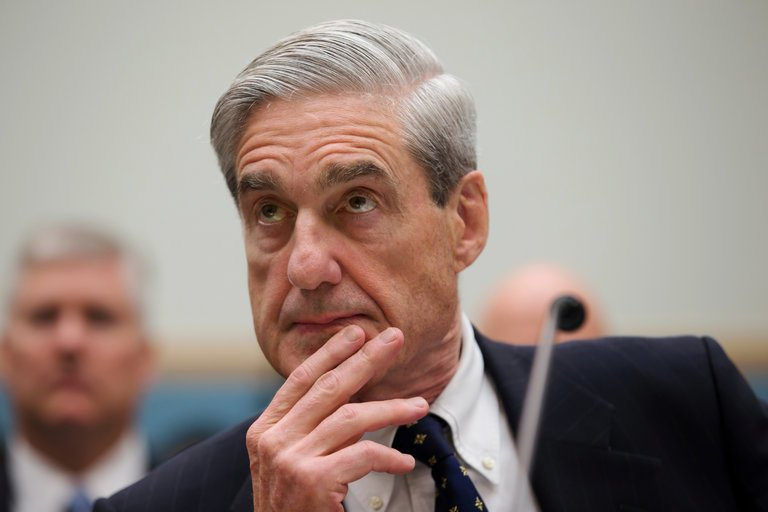Mueller report rules not enough evidence for obstruction charges
April 18, 2019
Special Counsel Robert Mueller’s report on his investigation into Russian interference in the 2016 presidential election was released Thursday, several weeks after U.S. Attorney General William Barr released his summary of it.
President Donald Trump took to Twitter in the aftermath of the publication of the report.
Trump tweeted a photoshopped image of himself with a similar font and format to Game of Thrones, saying “NO COLLUSION. NO OBSTRUCTION. FOR THE HATERS AND THE RADICAL LEFT DEMOCRATS — GAME OVER”
However, some people have said this may not mean there was no wrongdoing on the president’s part.
“In the political justice system we don’t say people are innocent, we say people are not guilty, which are two very different things and I think that the conclusion here is that Donald Trump is not guilty of collusion or obstruction but he is not innocent of attempting to engage in both of those,” said Kelly Shaw, senior lecturer in political science at Iowa State.
Mueller’s investigation did not charge the president or any member of his campaign for colluding with Russia in the 2016 election. However, the special counsel did consider charging Trump’s eldest son, Donald Trump Jr., over the June 2016 meeting he held with Russians in Trump Tower.
The special counsel declined to charge Trump Jr. because “the investigation has not developed evidence that the participants in the meeting were familiar with the foreign-contribution ban or the application of federal law to the relevant factual context,” according to Mueller’s report.
“There is probably ignorance in terms of processes, in the campaign, in the attempts of the Russians to interfere in the elections,” Shaw said. “When you take a step back and you think about this whole process the Trump administration and his son are not terribly sophisticated when it comes to politics, they don’t understand policy process or the partisanship elements that go into it.”
The report did not exonerate the president of the charge of obstruction of justice.
“If we had confidence after a thorough investigation of the facts that the president clearly did not commit obstruction of justice, we would so state. Based on the facts and the applicable legal standards, however, we are unable to reach that judgment,” the report said.
However, Mueller concluded “in the case of the obstruction-of-justice statutes, our assessment of the weighing of interests leads us to conclude that Congress has the authority to impose the limited restrictions contained in those statutes on the president’s official conduct to protect the integrity of important functions of other branches of government.”
Democratic party leaders in the House of Representatives, however, have pushed back on the possibility of impeachment.
“Based on what we have seen to date, going forward on impeachment is not worthwhile at this point,” House Majority Leader Steny Hoyer said. “Very frankly, there is an election in 18 months, and the American people will make a judgement.”
House Speaker Nancy Pelosi has previously said that she was not in favor of impeaching Trump, because Trump was “just not worth it,” and “because it divides the country.”
“I don’t think it will rise to that level — impeachment proceedings — I mean Nancy Pelosi is smart, that she realizes that impeachment could take place in the House, the makeup of the Senate is much different,” Shaw said.
The Department of Justice policy currently holds that a sitting president cannot be indicted for a crime.
“The Mueller report was in the Department of Justice which has to prove in a legal court if someone has committed a crime … just because you can’t charge someone with a crime doesn’t mean they didn’t do it and doesn’t mean they didn’t do anything wrong. Especially in the highest office of the country, there are different standards,” said Taylor Blair, junior in industrial design and president of College Democrats.
Trump frequently lashed out at his former Attorney General Jeff Sessions for allowing Mueller to be appointed special counsel in May 2017, after Trump fired FBI Director James Comey.
Sessions had recused himself from the investigation because of his role in the Trump campaign, Mueller was appointed by Deputy Attorney General Rod Rosenstein.
“After Sessions announced his recusal on March 2, the President expressed anger at the decision and told advisors that he should have an Attorney General who would protect him,” Mueller said in his report.
“One of the big takeaways is we get to see just how chaotic this White House is, how a number of people within his White House are hesitant to follow his demands,” Shaw said. “There is a lot of turnover currently, and that was seen in this report with how many people are unwilling to follow his orders. The White House continues to be a train wreck and the president tries to manage it without success.”
The report details the events that took place when Trump was informed there would be a special counsel investigation.
“When Sessions told the president that a special counsel had been appointed, the president slumped back in his chair and said, ‘Oh my God. This is terrible. This is the end of my presidency. I’m fucked,'” the report said.
Shaw said this statement doesn’t necessarily show guilt, but it does paint a broader picture of the Trump White House.
“I would guess he thought there were serious problems that would come out of this investigation,” Shaw said. “Again we get a picture from this report of a White House that is on fire basically.”
Reporting contributed by Emily Berch and Devyn Leeson.

















